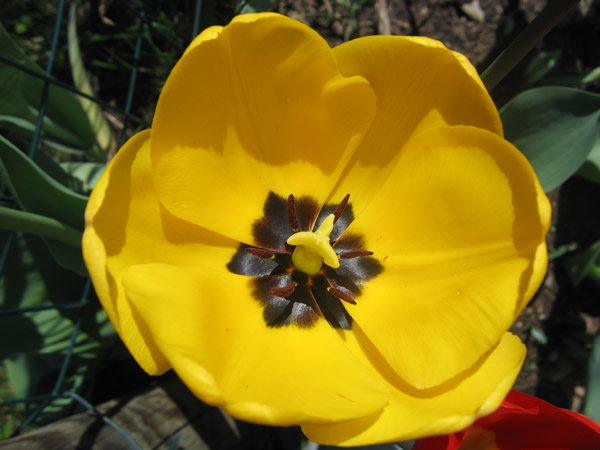“There are no more middle seasons” is the Italian equivalent of “Things ain’t what they used to be” – more than a truism, it’s a cliché of people complaining about the modern world, and resistance to change in general.
Taking it at face value, I don’t think the “middle seasons” have disappeared: I’ve rarely seen an abrupt transition from winter to spring to summer to fall anywhere in the world. However, though it is also a cliché to marvel about the strange behavior of the weather in all times and places, in the last few years the weather certainly seems to have gone crazy, at least in Italy.
The last three days of January are traditionally considered the coldest of the year and are called i giorni della merla – the days of the blackbird. This derives from an ancient legend that these birds used to be white, but one, finding herself about to freeze to death during these coldest days, took refuge in a chimney. She emerged black with soot, and her descendants have been black ever since (an example of Lamarckian inheritance).
Although this year January and February were unusually warm and dry all over Italy, everyone’s winter colds and flus seem to have been more virulent and lingering than in recent memory. This may be because there was no rain to wash away the winter smog, and the plants, confused by the warmth, started blooming early, bringing on seasonal allergies far too soon. Everyone blamed the unusual weather – blaming the weather for illness is a long-standing Italian tradition, whether that weather is averagely normal, severely normal, or completely unusual.
In late March the cold weather returned, but at least it brought rain with it. Another Italian seasonal saying is: Marzo, marzo, pazzerello – esce il sole, apri l’ombrello – “March, March, crazy little thing – the sun comes out, open your umbrella.” I suppose this refers to the phenomenon of patches of raincloud precipitating directly overhead, while the sun slants through from nearby patches of clear blue sky. (My Texan aunt used to call this “the devil beating his wife” – ?!?)
Now it’s April, with its own apposite saying: Aprile, ogni goccia un barile (“April, every drop a barrel”). Well, we haven’t quite been getting barrels of rain yet, but far more than we had during the winter; there’s even fresh snow on the peaks visible from our house.
The upcoming Easter weekend is supposed to be sunny and warm in Italy, to the delight of the over 8 million Italians who will be travelling somewhere or other for a vacation – schools are closed for up to a week, and some offices are also giving a long ponte. Myself, I plan to spend the holiday quietly at home – still trying to recover from my own lingering winter ailments.
What other sayings do you know about weather (in Italian or any other language)?






le mois d’avril n’ôtez pas un fil, le mois de mai faites comme vous voulez
which translates more or less:
the month of April, don’t remove a stitch (of clothing), the month of May do as you will.
This refers to April perhaps seeming warmer than it really is, might turn colder at any moment as opposite to May when the weather should be fine, However in my experience you can get pooky weather any time of year here.
love,
R
An Easter weather one (it’s in milan dialect and i’m not good at spelling it):
l suu sü l’uliva, l’aqua süi ciapp
Literal translation:
Sun on the olive, water on the [butt] cheeks.
Translation:
If the Olive Sunday (the one before Easter) is sunny it will rain on Easter (here cheeks stand for the the boiled eggs eaten on Easter).
Ciao
“Aprile, ogni goccia un barile” is not about barrels of rain.
It refers to the fact that every raindrop in this month, will be transformed in a barrel of wine in october.
Luca
Fascinating! In that case – bring on the April rain!
I have always loved the Flanders and Swann Song of the Weather (English Weather)… as follows… For any of you not familiar with Flanders and Swann, I heartily recommend them!
January brings the snow
Makes your feet and fingers glow
February’s Ice and sleet
Freeze the toes right off your feet
Welcome March with wintry wind
Would thou wer’t not so unkind
April brings the sweet spring showers
On and on for hours and hours
Farmers fear unkindly May
Frost by night and hail by day
June just rains and never stops
Thirty days and spoils the crops
In July the sun is hot
Is it shining? No, it’s not
August cold, and dank, and wet
Brings more rain than any yet
Bleak September’s mist and mud
Is enough to chill the blood
Then October adds a gale
Wind and slush and rain and hail
Dark November brings the fog
Should not do it to a dog
Freezing wet December then:
Bloody January again!
(January brings the snow
Makes your feet and fingers glow).
An old English saying coverng theis time of year: “February filldyke, March, black ram, comes in like a lion and goes out like a lamb”. “Filldyke” is a reference to February being wet – filling dykes (historically and, indeed, this year, though global warming means the saying is not remotely a reliable guide to what weather to expect, although it does also mean that in the English West Midlands, where I live, you are far more likely, these days, to see rain than snow). As far as March coming in like a lion and going out like a lamb is concerned, that is a reference, I believe, to equinoxial storms, caused by large temperature diferences between the tropics and the pole – as the strength of the sun in the northern hemisphere increases, with the arrival of spring, the tropical regions warm up more quickly than the polar reqions – for the simple reason that the sun doesn’t get above the horizon, at the north pole, until the spring equinox, on 21 March. Once the equinox has passed, the pole starts to warm up, the temperature difference declines slowly (the pole receives 24-hour-a-day daylight, as against 12 at the equator), and by the end of March, the storms cause by the temperature differential start to become less intense. March also sees, of couse, the start of the lambing season in the UK.
The reverse then happens in the autumn – as the sun disappears below the horizon after the autumnal equinox (equal day and night), the pole cools more rapidly than the tropics, the temperature differential increases, and the intense storms of late September/October appear.
Mark Twain (Samuel L. Clemens) has often been quoted as saying: “Everybody talks about the weather but nobody does anything about it.” Also, my favorite, since I live in New England: “If you don’t like the weather in New England, just wait a few minutes.”
Every place I’ve been in the US, people will say, “If you don’t like the weather here, wait five minutes [and it will change].” The only place I’ve observed this to be true is in the mountains of Montana.
We’re having an unbelievable cold snap today and tomorrow. It’s supposed to dip to 36 deg. F (2 deg. Celsius) in Houston, Texas tonight. Absolutely unheard of. My poor gardenias!
“If you don’t like the weather in Texas, wait a minute.”
This saying is probably used elsewhere, too, but it’s certainly appropriate here. We’d already been having temperatures well into the 80s all over the state, and then this past weekend, there was snow (as far south as Central Texas) as well as sleet and chilly rain. Lots of indoor Easter egg hunts.
I grew up in the Panhandle where we sometimes experience all four seasons in a 24-hour period.
Just a brief note. I came across your site accidentally and must say it is very interesting. Looking forward to reading more of your posts.
I believe I’ve heard it called (re: English weather) SAMPLES of weather…
We are certainly experiencing samples of weather here in the Metro DC area this April 2007 – tropical one day, snow the next…
Rosso di sera, bel tempo di spera; rosso di mattina la pioggia si avvicina.
🙂
if in the evening the sky is red, then we think it will be sunny the next day; but if the sky is red in the morning, then it’s going to rain 🙂
sorry if my english isn’t good enough 🙂
Mena said: Rosso di sera….
In English we say, “Red sky at night – shepherd’s delight, red sky in the morning – shepherd’s warning. “